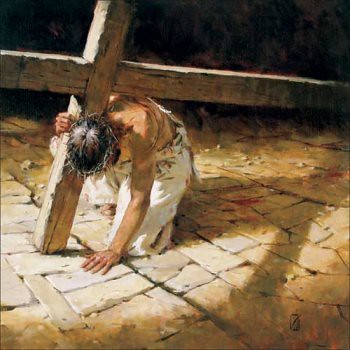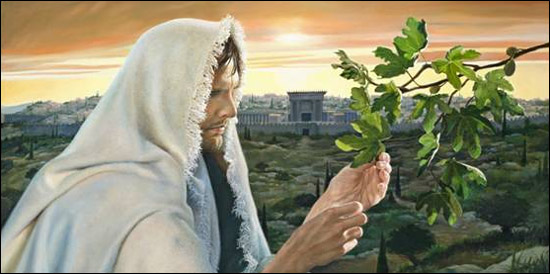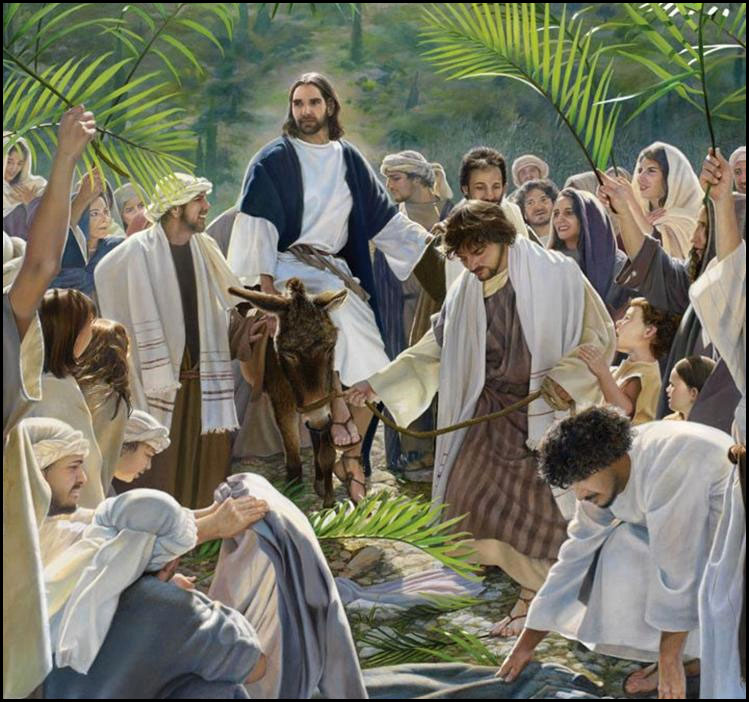
The Lord slowly stepped forward as the large wooden cross beam was placed upon his bruised shoulders. The sting of pain shot down his back as he bore the burden of the cross. As he began to walk the path that led through the city, he looked to the several women who had fallen to the ground by the overpowering of emotion. Step by step he carried his cross through the city until just before he reached the outer gates of the city where he fell to the ground. Exhaustion had over taken him and the loss of blood had exhumed his energy. The Roman soldier behind him cursed at him and brought his staff down upon his back with a crack! The pain was so intense that Jesus crumbled upon the stone walkway. “You! Carry his cross!” the Roman soldier yelled to an innocent onlooker. The man who had come from Cyrenian for the Passover looked in fear as he knelt down and took the cross beam from the Lord. Lifting it upon his shoulders he could feel the blood that had been on the cross drip down upon his back. He would carry the cross for a man he had never know; yet this Man knew his heart better than any other person on earth. This Man, though unable to carry his cross at this time, had born a burden far greater than a cross; he had carried the very weight of the world!
The day was Friday at about midday. Jesus had been condemned before the Jewish court, and then again condemned by the Roman government. According to Christian tradition, Jesus was then flogged 39 times; however, no evidence is given of the exact number in the gospels (see John 19:1). Whatever the case, though flogging could kill a man it was not designed to kill but to make the suffering on the cross all the more agonizing. Upon being flogged to the point that exhaustion and pain would almost overtake the body, Jesus then was commanded to carry His cross through the city (now traditionally marked in Jerusalem by the Via Dolorosa).
This Friday I had the opportunity to attend Catholic mass and then a Christian procession with some friends through Salt Lake City. As we began the procession we were asked at each of the seven stops “Who would carry the cross of Christ?” These words were very powerful as I thought of how Simon, though he was forced to carry the cross, symbolically took the place of each of us. In a sense, we each must ask ourselves if we would be willing to carry the cross. In fact before His death, the Lord commanded His disciples: “Whosoever will come after me, let him deny himself, and take up his cross, and follow me” (Mark 8:34). As I followed after those who were carrying the cross through the city, I thought of that day when His disciples had the choice to follow Him, even in death. I thought of what it must have been like to be there and see before you your Lord and Master carrying a cross that He did not deserve to carry.
For the Lord has truly carried our cross. He has carried our cross not only through the streets of Jerusalem, but He has carried it through a garden on the Mount of Olives. He has carried our cross into a dungeon filled with murders, through a trial where even those whom He would save would mock Him on every turn. He has carried it as He was bruised and scoured for our sakes. He has carried our cross as He looked into the eyes of His accusers not with hate, but with love unfeigned; enough love that He would even carry the cross for them. He carried the cross as He was hung on a tree only to be mocked and scorned by the very ones who would find access to His grace. Yet, all that He asks of us is to be willing to carry this cross that He for us has born. Not that we too shall suffer as He did, for He carried the cross for us that our burden may be light. He carried it so that when our cross is placed upon our bruised and weary shoulders, we may know that He stands by us to lift His back beneath the load that we might bear the weight more easily.
Thus, we each must ask ourselves, will I carry the cross I am called upon to bear? Will I follow the Lord in no matter what the circumstances may be? Will I look to Him that I may have my burden made light? Will I likewise help to make the load light for others? Will I turn away the weary, or will I put my shoulders beneath their loads that they might not falter? Will I lift those who may have fallen on their path to Calvary? Will I give relief to those who thirst as they trudge towards their hill of Golgotha? In short, will I follow the Savior and do His works?



